X10 Powerline Modules
WebIO versions 2, 3 and 4, use the X10 powerline protocol for communicating to
X10 modules. There are numerous x10 modules from many manufactures,
these modules range from lamp modules to light switches and relays.
X10 uses a house/unit code addressing systems with a list of commands such as
"on", "off", "dim" and others.
With each X10 module you assign it a house code (from A-P) and a unit code (from 1-16).
Many modules are addressed using a small dial for selecting house and unit code.
If two X10 modules have the same address they will both respond to the same
powerline message.
WebIO (like any other X10 controller) will then send out a house/unit code along
with a command (function code) to control a module(s).
For example: Plug in a lamp (with its light switch "on") into an X10 lamp module,
assign the module house code "A" and unit Code "1". From WebIO's "Control Devices"
or "X10 codes" webpage, send an "A1-On" powerline message.
WebIO then sends this message to its connected X10 Transceiver (such as the PSC05
or Powerlinc) which then broadcasts the message onto the AC powerline.
Your lamp module addressed "A1" will receive the message/command and turn on power
to the lamp.
There are far more X10 modules then listed here. X10 modules that use the standard
X10 protocol are compatible with WebIO. WebIO is not compatible with X10 modules
that use the extended protocol (this is rare).
For more information on WebIO X10 features see
WebIO FAQ.
Below is short list of many available X10 modules/devices. X10 modules can be purchased on-line
at ebay, here at webio.us or other on-line stores.
|
|
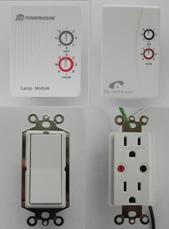
A sample of X10 modules
|
|
|
|
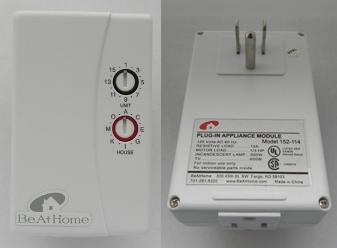
X10 Appliance Module

Appliance module useful for:
- Turn on/off fluorescent lamps
- Turn on/off AC/DC power supplies
- Turn on/off AC powered radio
- Turn on/off pumps, sump pumps, inductive loads
- Pulling module for current on/off state
|
|
This appliance module is used to turn on/off AC powered devices such as
fluorescent and incandescent lights, AC/DC power supplies,
or any devices that can be turned On or Off by controlling the AC power to the
device. An appliance module such as this one is recommended for
controlling inductive loads such as motors, pumps, fluorescent lighting with balasts.
Inductive loads should be controled by appliance modules which contain a relay
rather then controlled by X10 Lamp Modules which control lamps by
dimming, controlling the AC duty cycle.
This appliance module is a 2-way X10 module. This allows WebIO to ask the module
for its state of "On" or "Off". Note that 2-way modules powerline response message requires noise free
powerline conditions for its response to be reliably received by WebIO or any other X10 controller.
This appliance module is rated for a resistive load of 15Amp, 120VAC 60Hz.
This appliance module is availabe from webio.us as SKU# KE-2210.
|
|
|
|
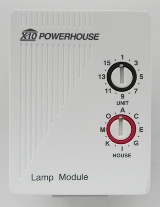
Lamp Module

|
|
This lamp module (model LM465) is ideal for tuning on/off and dimming incandescent lamps.
When receiving and "On" message this module quickly dims a lamp to full on,
this saves on the life of the light bulb and is softer on the eyes.
This lamp module is not a 2-way X10 device (it doesnt respond to X10 querys for current state).
Lamp modules that dim can NOT be used for controlling inductive loads such as
motors, pumps, fluorescent lighting with balasts.
Inductive loads should instead be controlled by appliance modules which contain a relay
having states of "On" or "Off",
instead of being controlled by X10 Lamp Modules which control lamps by
dimming, controlling the AC duty cycle.
This modules operates at 120VAC 60Hz, 300 watt incandescent Max.
Has 2-prong AC connection (no ground pin).
Lamp module useful for:
- Turn on/off/dim incandescent lamps
|
|
| X10 Wall Mount Light Switch |
|
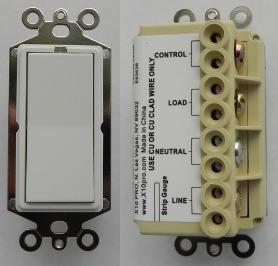
Light Switch

|
|
There are many X10 light switches available from many different manufactures.
Some wall mount light switches have dimming capabilites used for incandescent lights only.
Others are on/off only for use with incandesent and inductive loads.
Many models can be use in 3-way wiring and have house/unit code addressing dials under
the removable decore style switch plate.
The wall dimmer module pictured here is the XPS3..
Wall mount lamp modules:
- Turn on/off/dim incandescent lamps
- On/off only models for fluorecent lamps and inductive loads
- Easy replacement of hardwired switches
- Use manually or via X10 powerline message
|
|
|
|
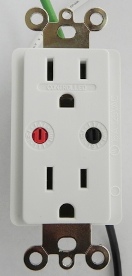
AC Receptacle

|
|
An X10 receptacle is useful for more permanet installation, replacing
the use of an appliance module.
The X10 receptacle is easy to address using house/unit code dials.
These modules are generally low cost and easy to install, replacing an existing
AC receptacle.
A disadvantage of AC receptacles is that they have no manual on/off control,
can only be turned on/off via X10 powerline message.
AC receptacle modules:
- Turn on/off incandescent lamps, fluorecent lamps and inductive loads
- Easy replacement of existing receptacle
|
|
|
|
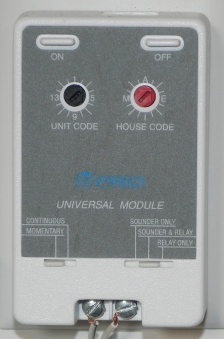
Universal Module

|
|
The X10 universal module operates an isolated relay to provide contact closure
(switching) of your own equipment.
When receiving an X10 powerline "On" message this module closes the contacts
of the provided screw termials, where an "Off" command opens the contacts.
When switched to momentary mode, this module closes the contacts for 1.5 - 2.5 seconds
when it receives an "On" message.
This module is useful for controlling your own low voltage equipment, such as
sprinkler systems, thermostats, door bells, etc.
This module plugs into an AC recepticle for power and X10 powerline communication.
AC receptacle modules:
- Turn on/off low voltage systems
- Interface WebIO to an existing security system
|
|
|
|